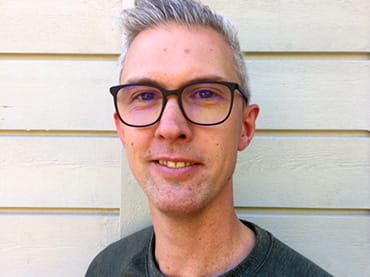The Challenge: A Head-On Collision With a Street Pole
Daniel, 37, was rushing to pick up his young children from preschool in May 2017. As he sped toward the door, he walked into a street pole and hit his left temple.
“It hurt very, very much, but I didn't think too much about it," says Daniel, a successful Swedish concert promoter.
Although he went to work the next day, it only took an hour to realize something was wrong.
“I felt strange," says Daniel. “The next day, I couldn't get out of bed and had a terrible headache together with extreme fogginess."
He went to the ER where a nurse told him he had a concussion. She gave him a brochure instructing him to rest and stay home in a dark room.
Unable to work, Daniel received compensation through the Swedish healthcare system. But it was far less than the salary he earned in the music industry.
“It was expensive to stay home," he says. “I needed to earn money; I was eager to return to work as fast as possible, but my body stopped me."
As weeks and months passed, Daniel's condition began to take a toll on his personal and work life.
His symptoms included:
- Constant headaches
- Fatigue
- Dizziness
- Vertigo
- Mood swings
- Anxiety
- Panic attacks
The Path to the UPMC Sports Medicine Concussion Program
In his quest to find relief, Daniel met with at least a dozen specialists, including a:
- Neurologist
- Physical therapist
- Behavioral therapist
- Chiropractor
He even tried alternative treatments like:
- Acupuncture
- Massage
- Yoga
- Mindfulness
- Healing
One doctor advised him to try a less stressful career.
“I was willing to try everything — even things I didn't believe in," says Daniel. “I woke up every morning hoping the feeling in my head would be gone, but it wasn't. I was losing hope."
At his lowest point, Daniel even thought about suicide.
“I felt I would never be the same again. And that I'd have to live with these symptoms the rest of my life," he says. “My whole family struggled. My mood swings were terrible. I went from being a happy guy to a depressed guy."
Desperate for answers, Daniel searched the internet for help.
He found many blog sites to be depressing, written by people who had struggled with concussion symptoms for years. But he finally found one written by a grateful patient who had successful treatment at the UPMC Sports Medicine Concussion Program.
“I felt sure this was what I needed," says Daniel.
The Solution: An Exposure and Recovery Approach to Concussion Treatment
In July 2018 — 14 months after his accident — he flew to Pittsburgh and met with program director Michael “Micky" Collins, PhD.
“I'll never forget it. Dr. Collins looked me straight in the eyes. He said, 'We're going to do everything in our power to help you feel normal again. I promise you,'" Daniel recalls. “I started crying. That was the first time anyone said I should be fine."
Having read the blog article detailing Dr. Collins' "exposure and recovery" treatment approach, Daniel was ready to get to work. It was the exact opposite of the bed rest, quiet, and darkness his doctors in Sweden prescribed.
“It made sense to me to do what made me feel bad so my brain could get used to it," he says.
Under Dr. Collins' care, Daniel returned home with an individualized treatment plan. It included exercises and repeated exposure to sights, sounds, and settings that made him uncomfortable.
Daniel kept in touch with the UPMC Sports Medicine Concussion Program via email and phone.
"The first three or four weeks were awful," says Daniel. "But I was never afraid. I was full of confidence. I gradually began feeling better."
"It was such a relief to work with specialists who took me seriously and who understood right away what I was going through." — Daniel
The Results: On The Way to a Full Recovery
In October 2018 and January 2019, Daniel came back to Pittsburgh for follow-up appointments. He met with Dr. Collins and his team of specialists, including Raymond Pan, MD, a clinical psychiatrist.
Dr. Pan prescribed medicine to help with Daniel's anxiety and depression.
Each time, Dr. Collins tweaked his treatment plan while Dr. Pan adjusted his medication.
"It was such a relief to work with specialists who took me seriously, and who understood right away what I was going through," says Daniel. "They listened to me and treated me as a whole person."
When he continued to struggle with fatigue, Dr. Collins referred him to an eye specialist.
The eye doctor altered Daniel's eyeglass prescription and added a blue light filter to help with computer usage.
"I felt a difference right away," says Daniel. "It helped with my fatigue and headaches."
Today, Daniel says he's almost fully healed, with occasional brief headaches and nighttime sluggishness.
He's also back to work as a concert promoter and now heads the renowned Gothenburg Culture Festival. And, whenever he has the chance, Daniel does his best to spread word of the UPMC Sports Medicine Concussion Program in Sweden.
"I'm so happy. It was a lot of money for someone without American health insurance to travel to Pittsburgh for treatment. But health has no price," says Daniel.
"I love Pittsburgh — it's the city that saved my life. Going to UPMC was life changing. I'm back again, and it was worth every penny," Daniel says.

















